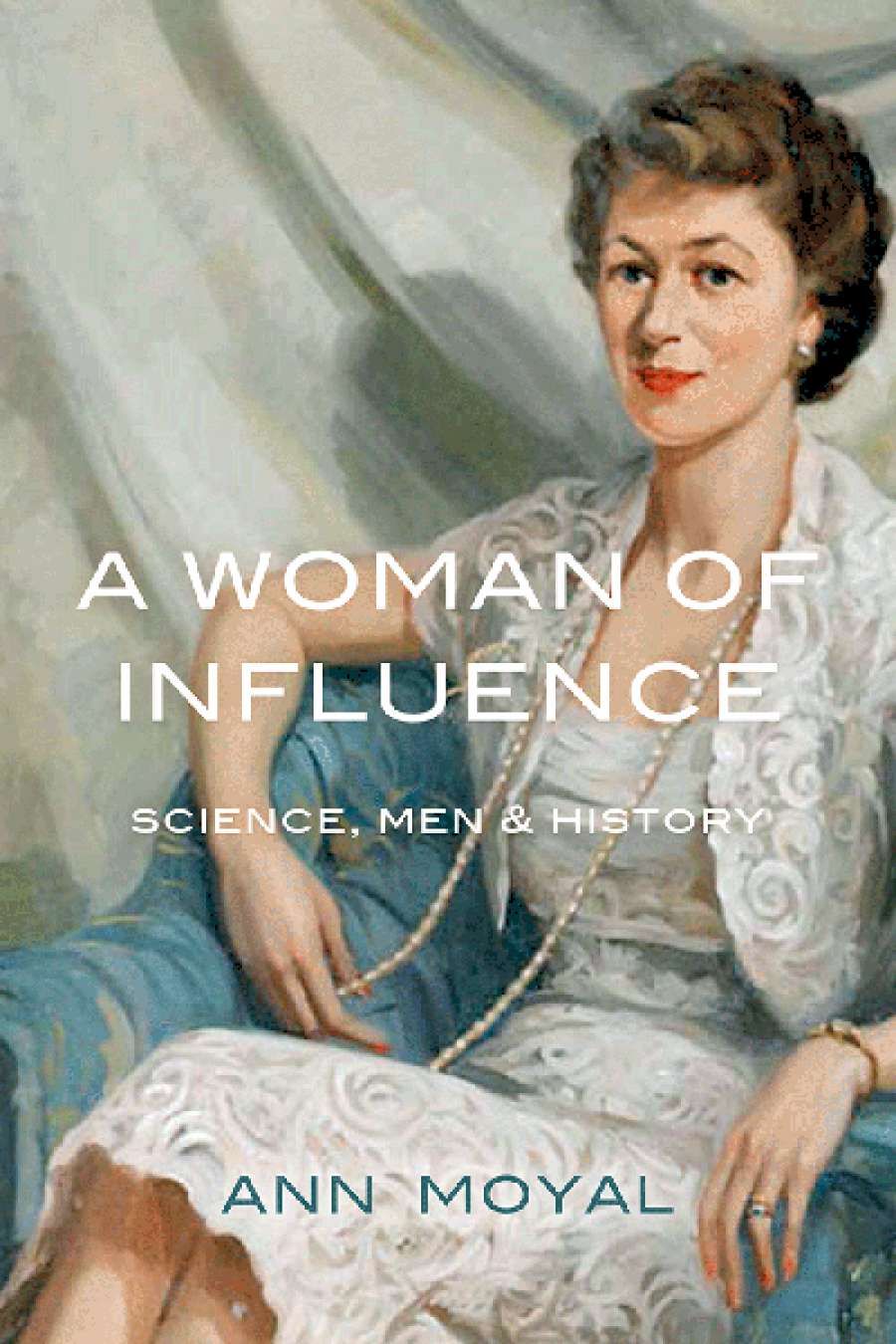
- Free Article: No
- Contents Category: Memoirs
- Review Article: Yes
- Online Only: No
- Custom Highlight Text:
Ann Moyal was born in 1926, so now she is heading towards her ninetieth birthday. She has already launched a work of autobiography into the world, written in her mid-sixties. But her life did not, then, ‘take a quieter turn’. On the contrary, she tells us, ‘I’d continued to spend my ageing life with passion, involvement, and intensity.’
- Book 1 Title: A Woman of Influence
- Book 1 Subtitle: Science, men and history
- Book 1 Biblio: UWA Publishing, $34.99 pb, 212 pp
Ann Moyal’s earlier autobiography, Breakfast with Beaverbrook (1995), tells about her work in London in the 1950s, researching and assisting in the writing of Men of Power, one of several historical analyses undertaken by the Canadian proprietor of British tabloids who became Lord Beaverbrook. It tells of her return to Australia to assist in establishing the Australian Dictionary of Biography with the man Ken Inglis called ‘the Archbishop of Australian historians’, Keith Hancock, who also set her upon the massive project of finding, documenting, and writing about Australian scientists and their work – a project that occupied her for several decades. She revisits both English and Australian ventures in A Woman of Influence, detailing the plaudits she won.
Moyal’s mother named her after the heroine of H.G. Wells’s famous novel, Ann Veronica (1909). It was, accordingly,
almost predestined that I would take on some of the characteristics of this rebellious creature, child of a conservative British household in the late nineteenth century who had taken to science, fallen in love with her biology teacher, proclaimed free love, and declared that she ‘wanted to take life by the throat’. Taking up her buoyant cry, I had done so.
One thing that followed was that, she notes, ‘I have the ingredients in me of a “bolter”’, as her first two brief marriages attest. She wrote about her third and longest-lasting marriage in Maverick Mathematician: The Life and Science of J.E. Moyal (2006), but the story of her ‘Late Love’ in her seventies is new. A ‘relationship’, not a marriage this time: ‘“A relationship”, I thought, “how modern!”’ For two years, this overlapped with the last years of Joe Moyal’s life. ‘Can one love two people at the same time?’ she asks, and answers: ‘I found it so.’ She and the man she calls ‘M.’ were not ‘to go into a great old age together’, though. A moment of strain appears in her wonderfully unguarded note on the differences in their temperaments: ‘M. prized the adage, “silence is golden” while I, a communicator, liked to chat. “I like talking to you”, he once remarked, “Why not try listening?” It was then that he considered that “Ssh” would be an appropriate epitaph on my tombstone.’ Eventually, her longing for ‘a more committed share of time’ led to their break-up. She claimed this as her own initiative: ‘Bolting at 80,’ she comments wryly, ‘seemed unnaturally pioneering.’
Beaverbrook had confirmed her bolter tendencies. He taught her ‘to be independent; not to take establishments and the established as seriously as they take themselves; not to be snowed by authoritative figures or “mini-men”; and to question the sources of power’.
Not surprisingly, then, she did not fit happily into the hierarchical structure of Australian universities, institutions so dominated by men; both of her non-research appointments were brief. Perhaps this explains her title: a woman ‘of influence’ rather than of ‘achievement’ or ‘distinction’. But she was not to be defeated. Her ‘literary alter ego “Ann Veronica” was wont to cry, “I’m not a good type of woman; there’s something of the male in me!”’ In 1993, from a base in Canberra’s Centre for Cultural Studies, Moyal launched a proposal for an association of independent scholars, a major achievement.
Nevertheless, she has gained recognition from the institutions of higher learning. She has been made a Doctor of Letters by two Australian universities and an Honorary Fellow of the Australian Academy of the Humanities. These acknowledgments figure in A Woman of Influence; it would not have been inappropriate to use words like ‘achievement’ and ‘distinction’ in her title. But she may have considered that immodest, preferring to give space to her own warm appreciations of the friends and colleagues which stud this work.
Ann Moyal never calls herself a feminist, just as, she tells us, her sister, Mary Hurley (Mimi), who formed ‘a deep and lasting companionship’ with Judith Ryan, ‘fiercely rejected any styling as “lesbians”’. But she does not hesitate to emphasise the pioneering achievements of other women. Among them, she devotes a whole chapter to the life and work of Fay Gale, whose appointment as vice-chancellor of the University of Western Australia in 1990 brought with it considerable personal cost, even as she went on to become the first woman appointed president of the Australian Vice-Chancellors’ Committee and the first woman appointed president of the Academy of the Social Sciences in Australia.


Comments powered by CComment